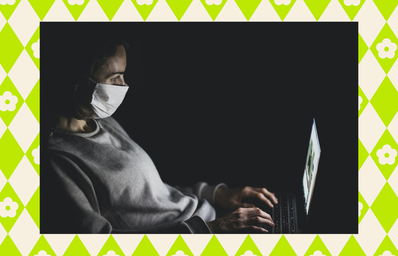In the past two years while the world was on lockdown, you’ve probably felt some congestion or a small fever and immediately gone to Google to search your symptoms, leading you down a rabbit hole of self-diagnosing online. Whether you’d like to admit it or not, you’ve most likely tried to ease health concerns and anxieties by relying on WebMD or other symptom-checker platforms — but most of the time, while looking to calm health-related concerns, people using online symptom-checkers are instead given hundreds of over-dramatized diagnoses.
A survey completed in 2019 by LetsGetChecked, a personal health testing company, found that 65% of the 2,000 Americans included in the poll relied on the internet to diagnose their symptoms, and Gen Z specifically has started to rely on social media for mental and physical health diagnoses.
Let’s be honest, relying on the internet and self-diagnosing your symptoms during the peak of the pandemic was often easier than making an appointment at a doctor’s office. However, self-diagnosing can lead to the dangerous act of misdiagnosing, which can lead to further health-related issues in the future if not treated properly.
The internet is almost never completely correct, so why do we continuously rely on its answers instead of reaching out to a medical professional? Why is it comforting to receive a diagnosis after just a few clicks? Her Campus talks to medical professionals about their opinions on self-diagnosing: why it happens, how to stop, and what you can replace self-diagnosing patterns with.
Why Self-Diagnosing Is Harmful
Gen Z tends to prefer going online and receiving a diagnosis rather than undergoing the trouble of going to an in-person doctor’s office. However, relying on the internet for answers instead of a licensed professional is the first step to medical misdiagnosis.
“The problem with self-diagnosing is that you never truly know if you’ve made an accurate conclusion. It can leave you in a constant state of anxiety and obsession.”
Nancy Mitchell, a registered nurse, acknowledges the uncertainty within self-diagnosing. “The problem with self-diagnosing is that you never truly know if you’ve made an accurate conclusion,” Mitchell tells Her Campus. “Self-diagnosing can leave you in a constant state of anxiety and obsession.”
Mitchell also recognizes that there are hundreds of conditions with similar symptoms. “As an unqualified ‘researcher,’ it’s hard to tell which of those diseases best fits your case. Say another symptom shows up unexpectedly, and it no longer matches your initial self-diagnosis. That means you’re back to square one, searching the depths of the internet for answers,” Mitchell says. A doctor can break down your signs in a way that the internet cannot.
Dr. Nicole Lacherza-Drew, Psy.D., CCJP, CCAJP, a licensed psychologist, references the intense practices that medical professionals must obtain in order to properly diagnose patients. These practices are what makes it impossible for people to properly self-diagnose. “Diagnosing takes years of education, training, and supervision. There are various assessment tools that are used in the process of diagnosing and without proper training on these tools, people can be misdiagnosed by themselves or other providers. It isn’t as simple as just checking off a box,” Dr. Lacherza-Drew tells Her Campus.
Dr. Lacherza-Drew also addresses the danger with self-diagnosing mental health symptoms, which has increased through the use of social media. “Someone with anxious or depressive symptoms can actually have their symptoms worsen if they are looking at inaccurate information, self-diagnosing, and not getting the help that they need,” Dr. Lacherza-Drew says. Yes, self-diagnosing may relieve some stress in the moment; however, in the long run, that person could be missing out on critical treatment that can support, heal, and guide them toward recovery, whether that be mentally or physically.
Why is it So difficult to stop self-diagnosing?
With the support of a primary care provider or a doctor who is familiar with your medical history, patients are more likely to just make an appointment with them instead of relying on the internet. However, in a 2019 study from Accenture, only 55% of Gen Z is likely to have a primary care provider — the lowest percentage of all generation groups. Without having a primary care provider you can rely on in times of medical anxiety, people are far more likely to resort to online self-diagnosing every time they feel slightly feverish or have a congested nose.
“Healthcare can be very expensive for many people, so the idea of going straight to the doctor with a concern might be out of reach. Dr. Google is free.”
Jessica Frick, a licensed professional counselor, respects the financial demands of being medically established. “These days, healthcare can be very expensive for many people, so the idea of going straight to the doctor with a concern might be out of reach. Dr. Google is free,” Frick tells Her Campus. The crux of the matter is this: Google is free, going to the doctor is not.
Because of the constant access that Gen Z has to online answers, self-diagnosing can quickly become addicting. “We are so used to just typing in a question in a search engine and taking the first thing that pops up,” Dr. Lacherza-Drew says. As easily as we rely on the internet for the latest celebrity dating updates, which are often less than true, we rely on our favorite search engines to keep us healthy and medically up-to-date. Once you start self-diagnosing, it’s incredibly difficult to stop.
Practices to Try Instead Of Self-Diagnosing Online
Breaking the self-diagnosing cycle can be grueling — however, it can be very beneficial for your personal growth, both physically and mentally. Establishing a relationship with a primary care provider can be one step toward moving away from self-diagnosing practices, but there are other ways to approach this change. Dr. Lacherza-Drew gives Her Campus readers four steps toward healthy diagnosing practices:
- Reach out to your insurance for information on primary care providers. Then, speak to your primary care provider about your symptoms and see what they recommend.
- If you have a mental health concern, find a mental health provider in your area or online that you can speak to about your symptoms.
- Remember that just because you might experience a symptom doesn’t mean you have a diagnosis. For instance, plenty of individuals have nightmares, but that doesn’t necessarily mean they have a sleep disorder.
- Unless you are trained in diagnosing (and even then you should go to someone else that’s not you), stay within what you know. Use online symptom-checkers as tools to help guide you to someone who can provide you with accurate, reliable, and valid information.
“Sites like WebMD are good after you have a diagnosis — to examine treatment options [and] to look at medication interactions or side effects.”
While sites like WebMD are known for their negative effects on the healing process, clinical psychologist Dr. Lori Bisbey says that it’s best to use them as a curing tool, not as a doctor. “Sites like WebMD are good after you have a diagnosis — to examine treatment options [and] to look at medication interactions or side effects. Though be careful not to trigger anxiety when reading the list of side effects,” Dr. Bisbey tells Her Campus.
The next time you start to feel a little sick, don’t rely on Google and WebMD right away. Online self-diagnosing will only lead to anxiety, misdiagnosing, and a strong disbelief in the power of medical professional opinions. If you’re experiencing symptoms and don’t quite know what to do, reach out to people you trust — parents, on-campus health providers, or even urgent care centers. Get their opinions from there and take the next few steps to make sure you and your body get the physical care you need and deserve. Don’t feel the need to answer all your questions on your own. Mental and medical professionals can help guide you to appropriate and quick healing practices.


